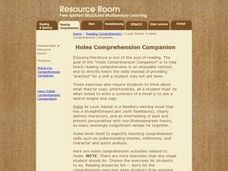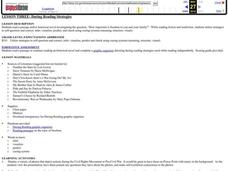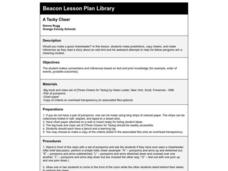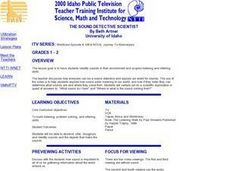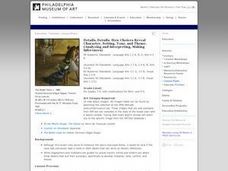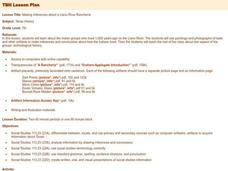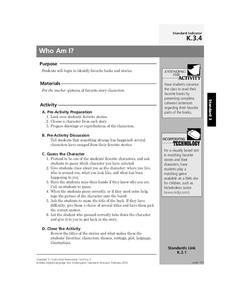Curated OER
Using MY NASA DATA to Determine Volcanic Activity
Learners explore how aerosols are used in science to indicate volcanic activity and how biomass burning affects global aerosol activity. Students access data and import into MS Excel using graphical data to make inferences and draw...
Curated OER
Keep Away
Study biological diversity by analyzing given data, and make inferences about the possible effects of oil drilling operations on specific benthic communities. This lesson allows students to use their statistical analysis skills asweel as...
NOAA
It's a Roughy Life
Scientists recently discovered several previously unknown species at the Bear Seamount off the coast of New England. Scholars research these new species — benthopelagic, benthic, and seamount fish — and find out what makes them unique....
Curated OER
Layers of the Rainforest
What a great way to discuss the rainforest! Learners discuss the importance of adaptation in the environment and how it is linked to survival. They use critical thinking and inference skills to place animals and insects in the different...
Curated OER
Holes Comprehension Companion
Here is a one-stop planning resource for Louis Sachar's Newbery Award-winning book Holes. You'll find 21 links to worksheets and various activities designed to span the entire book. Learners draw to help analyze settings and make...
Curated OER
Statistics Canada
Students practice using graphing tools to make tables, bar charts, scatter graphs, and histograms, using census data. They apply the concept of measures of central tendency, examine the effects of outliers. They also write inferences and...
Curated OER
During Reading Strategies
"How important is freedom to you and your family?" The guiding question becomes much more powerful after your class reads and responds to a passage from a historical novel. While reading the passage, they complete a graphic organizer...
Curated OER
English Lesson Plans for Grade 7
Discuss the correct use of certain phrases such as "managed" and "could" in this English instructional activity. Middle schoolers listen to interviews on work customs in different countries and compare them. They make inferences after...
Curated OER
Idioms
Use this podcast lesson plan to familiarize scholars with the characteristics, history, and cultural implications of idioms. As part of the Walking Classroom curriculum, kids listen to a 12-minute podcast as they walk around campus. If...
Curated OER
The Museum as a Time Capsule: Mongolian Example
Students make defensible inferences based on observation of perceived evidence. They use observation and inference to recognize the validity of alternative approaches or solutions.
Curated OER
A Tacky Cheer
Second graders make predictions, copy cheers, and make inferences as they read a story about an odd bird and his awkward attempts to help his fellow penguins win a cheering contest.
Curated OER
Wig-wag Physics
High schoolers make observations on the effects of a small, medium and large weight on the movement of a wig-wag apparatus. They use their observations to develop a generalized inference of the effect weight on movement patterns.
Curated OER
Are We Alone
Seventh graders collect/analyze data and draw conclusions; support reasoning by using a variety of evidence; construct logical arguments; access information at remote sites using telecommunications; apply the concept of percent;...
Curated OER
the Sound Detective Scientist
Students identify sounds in their environment and acquire listening and inferring skills.
Curated OER
Inferring Height From Bone Length
Students determine the relationship between bone length and height. In groups, they are told the race and gender of the individual and discuss how this affects height. They measure the lengths of the bones in metric measurements and...
Curated OER
Alcohol: Separating Fact from Fiction
High schoolers obtain a clearer understanding of their knowledge about alcohol, recognize that their attitudes, beliefs, & knowledge about alcohol may be different from their peers, and gain experience with scientific methods.
Curated OER
Details, Details: How Choices Reveal Character, Setting, Tone, and Theme. (Analyzing and Interpreting, Making Inferences)
Learners respond to works of art. In this art interpretation activity, students examine images of art while using concepts they learned as they read literary pieces. They detail the setting, characters, and the mood and theme of the...
Curated OER
Making Inferences About a Llano River Rancheria
Seventh graders research the Indian groups that lived 1,000 years ago on the Llano River. They analyze paintings and photographs of tools and artifacts, develop inferences and conclusions about how the Indians lived, and present the...
Curated OER
Clues to the Past
Students take a 1.3 mile walking tour of Chippokes Plantation, inspect significant historic buildings and artifacts, and make inferences about plantation life from their observations while answering a series of questions.
Curated OER
Cool! Awesome! What is it?
Students infer what a mysterious object is in a photo. For this inference lesson, students practice their scientific skills to identify what they see. Students enjoy solving the mysterious identity of objects and extending their...
Curated OER
Who Am I?
Students read a story together then choose a favorite character to portray. In this inference lesson, students pretend to be one of the characters in the story, they prepare drawings or actions then present them to the class. Students...
Curated OER
Propaganda
How does word choice affect the reading of a text? Compare two headlines that were written about the same event. Is one biased? Discuss how word choice often reveals the author's feelings about a topic. Then look at different techniques...
Curated OER
Dinosaur Tracks and Critical Thinking
Get your young scientists excited about geology through the study of dinosaur tracks! They will use their power of observation to learn how tracks are made and use critical thinking strategies to suggest a scenario in which they were...
Curated OER
It's a Gas! Or is it?
Examine the effects of temperature and pressure on solubility and the states of matter of ocean water. Learners make inferences about the unique chemistry of ocean water at different depths. They engage in an activity related to...
Other popular searches
- Making Inferences Worksheet
- Teaching Inference
- Inference Lesson Plans
- Observation and Inferences
- Making Inferences in Reading
- Reading Making Inferences
- Making Inference
- Inference Skills
- Observation Inference
- Making Inferences Grade 2
- Inference and Conclusions
- Making Inferences Stories






